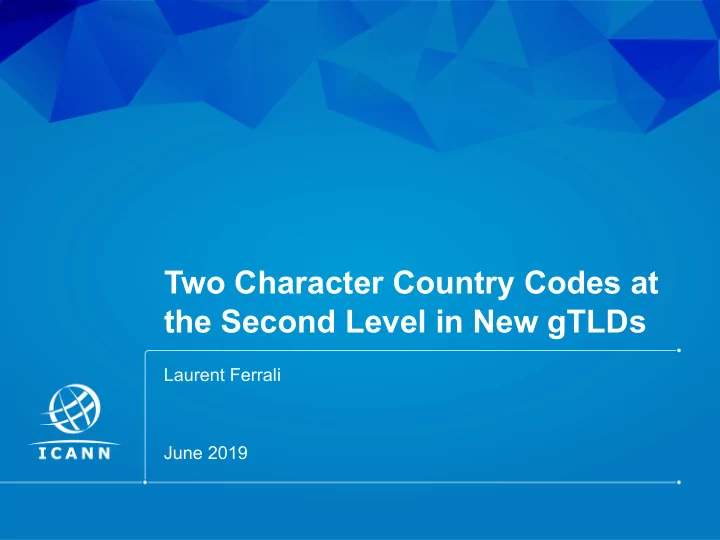

Two Character Country Codes at the Second Level in New gTLDs Laurent Ferrali June 2019 | 1
Setting the Scene | 2 | 2
Framework of the GAC Discussion 1 ¤ Specification 5, Section 2 of the Draft new gTLD Registry Agreement (part of the New gTLD Applicant Guidebook developed by ICANN Community and adopted by the Board) specified two different ways to release the 2-character country codes: “The reservation of a two- character label string may be released to the extent that Registry Operator reaches agreement with the government and country-code manager, or , The Registry Operator may also propose release of these reservations based on its implementation of measures to avoid confusion with the corresponding country codes” ¤ The objective of this Registry Agreement provision is to avoid confusion with the corresponding country codes ¤ confusion is registrants misrepresenting an affiliation with a government or ccTLD,which would likely be about use/content rather than existence. ¤ This provision is part of the adopted New gTLD Registry Agreement | 3
Framework of the GAC Discussion 2 ¤ It is crucial to understand from the very outset that: The Registry Agreement is about two parties (the Registry and ¡ ICANN Org) and ICANN Org is the sole actor in charge of the enforcement of the provisions related to Registry obligations ¡ The provision related to the 2 character code registrations aim to avoid any confusion with the the corresponding country codes. That’s the sole objective of this provision ¡ From a legal perspective ICANN Org is not able to grant any “authorization process” to the GAC without any pre-existent legal background (International Treaty, ICANN’s Policy) | 4
Conclusion ¤ The 2 Character code provisions of the Registry Agreement aim to avoid any user confusion with the country codes or affiliated government. ¤ These provisions can not be perceived as granting any global authorization role for governments because ICANN is not able to create such legal norm (no pre-existent legal framework International Treaty or ICANN PDP) ¤ The implementation of measures to avoid confusion is the responsibility of ICANN Org | 5
ICANN’s Measures to Avoid confusion | 6 | 6
ICANN Org’s support for governments ¤ Identification of potential confusions: 2Character Codes Search Tool ¡ This Search Tool allows governments to access online information related to the registrations at the second level of two-character codes that ISO assigned to their country/territories ¤ Reporting of potential confusion ¡ Governments play an active role here by reporting any potential confusion | 7
Measures to avoid confusion Measures adopted by ICANN Board during ICANN57 meeting in Hyderabad ¤ Exclusive Availability Pre-Registration Period (voluntary): Registry Operators may implement an exclusive availability pre-registration for governments or ccTLD operators to register domain names corresponding to their country codes, before the names are generally available ¤ Registration Policy : Registry Operators must include a provision in the registry’s registration policy requiring registrants to avoid misrepresenting affiliation with a government or ccTLD; and Post-Registration Complaint Investigation : Registry Operators ¤ must investigate and respond to reports of confusion from government or ccTLD operators ¤ ICANN org is responsible for the enforcement of these measures | 8
Focus on enforcement of the Registry Agreement ¤ •The measures adopted by an Registry Operator are a part of its contractual obligation with ICANN and enforceable by ICANN Compliance . These measures are in addition to other safeguards related to abusive domains that are already in the registry agreement. There have been no reports of misuse of a relevant country code at second level to ICANN Compliance department ¤ If a government or country code operator identifies instances of misuse of a two-character SLD by an RO, the Registry Operator is obligated to investigate and respond . If there is no satisfactory resolution, the government may utilize the full extent of ICANN’s Compliance department to request an investigation . | 9
Visit us at icann.org
Lack of pre-existent legal background 1 Source: https://unstats.un.org/unsd/methodology/m49/ | 11
Lack of pre-existent legal background 2 Source: https://unstats.un.org/unsd/methodology/m49/ | 12
Lack of pre-existent legal background 3 ¤ Lack of ICANN Policy | 13
Recommend
More recommend